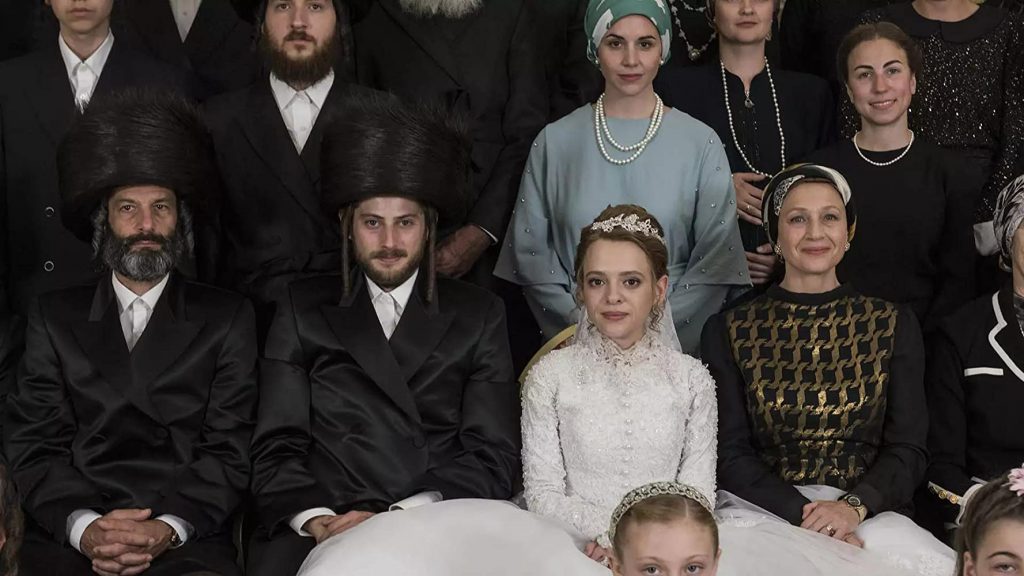By Anna Heledd
As someone who ravishes in learning about cultures so distant from my own, I was very eager to watch Netflix’s Unorthodox upon its release. Adapted from a Deborah Feldman’s 2012 memoir, ÔÇÿUnorthodox: The Scandalous Rejection of My Hasidic Roots’, the show follows the devastating yet empowering tale of 19 year old Esty Shapiro (Shira Haas); a Hasidic Jewish woman on the journey to find her own voice and identity.
The story begins with our heroine Esty fleeing her dysfunctional family, unequal marriage and her Satmar Jewish community in Williamsburg, New York, to Berlin. It is here her journey slowly begins to unfold when she befriends a group of music student from a very prestigious school. They are modern and progressive; to a degree that might appear very blas├® at some points. It is interesting to watch her slowly become herself, and talk about her community from home, even if it is in an apprehensive manner. Still, Etsy learns a lot about acceptance and tolerance through the people she meets along the way; befriending a gay couple, and an Israeli woman who teaches her to challenge some of the beliefs of her religion in regards to the status of woman in the Satmar Jewish community.
Unravelling itself through flashbacks, Etsy’s past incredibly juxtaposes the new sense of freedom she found in Germany, whilst still demonstrating her resilience and courage all throughout her daily struggles in a space where she is not seen or heard. Not only is her privacy constantly invaded by her entire community but her overbearing mother in-law essentially tries to strip Esty of her identity. Reinforcing toxic and traditional religious beliefs, she reminds Esty that “a man should be treated like a king” by his wife; scolding her for not being able sexually satisfy Yanky (Amit Rahav), when in fact she is suffering from a painful condition called vaginismus. However, her sexual experiences in Germany release her from all of these issues. Through Robert (Aaron Altaras), a student at the academy, Etsy is given the liberation to blossom from organic romantic chemistry that is passionate and innocent.
From the filming in New York, to Berlin, the cinematography acts as the perfect canvas to tell Esty’s story. Her wedding New York is absolutely beautiful, effectively showing one of the most important parts of Jewish culture for a woman. Additionally, all the events surrounding the ceremony, be it Esty shaving her head, or performing the ritual bath are beautifully centred around Esty and her sole experience of it all. Scenes prior to Berlin are very calm colours, expressed in the warm Earth tones of the buildings. The muted background makes the characters, and their religious garments, stick out immensely. Our focus is entirely on how the religion is leading the characters’ lives. Upon arrival to Berlin, however, this all changes.
“Esty is reborn in one of the most important scenes of the show at the beach on her first day in Berlin where she takes off her wig. The sun radiates and makes the scene hazy. As Esty walks into the water and embraces her new life free of her community, leaving her old one behind under the shallows of the sea“.
But like any good drama, the stakes must be raised. In just four episodes, the show was a roller coaster emotion of defeat, happiness but most importantly hope. Just as Esty starts settling in Berlin and adjusting to her new life, her husband Yanky and his brutish cousin hunt her down and arrive with a set plan to bring her back to the community in Williamsburg. Upon discovering that Esty might be pregnant with his child, there is a certain type of sympathy we feel for Yanky when they finally confront each other. Their relationship is complicated, but ultimately, the bond that they share is hard to ignore. Perfectly shown in the touching scene of their reunion in the hotel room, where Yanky cuts off his ringlets (or payots) so she and their unborn baby can return to Williamsburg. In this scene, Yanky proves to be naïve, and we are left unsure of whether he wants her back to love her, or to live the life that their religion prescribes them. It is clear that he has been so heavily under the influence of his superiors, that the character himself is desperate to live his life by what others expect of him. Yanky lives comfortable under the restrictive guidelines of his community, guided completely by his mother.
Unorthodox is the first Yiddish Netflix limited series to be made. This is monumental in representing communities that are usually hidden away from the Western gaze. The writers and producers took replicating the community incredibly seriously, according to the documentary discussing the behind the scenes research that went into it. They hired Jewish staff who were specialists on the community as experts and recreated the religious garments to the closest and most accurate details.
However, this show did not come without its criticisms. Some believed that the representation of the Satmar Hasidic community was inaccurate and hurtful. Although this series is based off of Feldman’s memoir, she claimed that she strayed from replicating her own story, as she wanted to portray the common pattern which she saw when interviewing hundreds of other women who had left the community. Criticism came from people such as Gitty Weiss, a therapist in the Hasidic community, who claimed that the series interprets the followers of the religion as ÔÇÿ’lifeless” and ÔÇÿ’oppressed”. She argues that ultimately, at the time where there is so much anti-Semitism, it’s a ÔÇÿ’slap in the face”.
Though it is important to note that Feldman had no role on the production of the show, apart from assisting some scenes. The writer’s own experience was very loosely connected to the creation of the show.
Despite the backlash the show has faced, Unorthodox is ultimately a thrilling story of rebellion and freedom. It is a story that teaches you how to be human.




